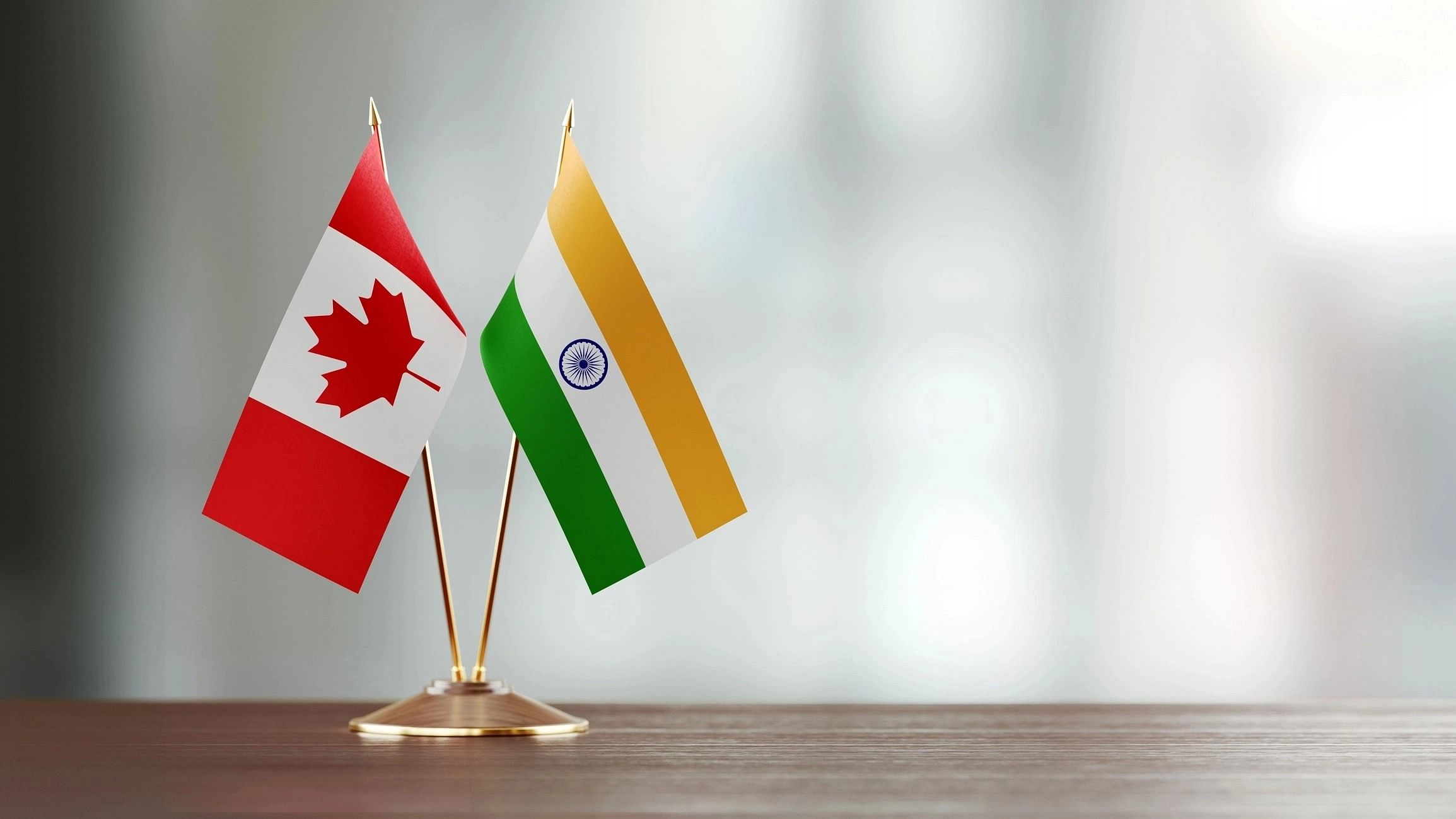
The flags of Canada and India.
Credit: iStock Photo
New Delhi: Ottawa has withdrawn 41 of Canada’s 62 diplomats and consular officials from India, complying with New Delhi’s deadline that would have expired Friday.
Even as the 41 diplomats and consular officials of Canada left India on Wednesday and Thursday along with their 42 dependents, Ottawa vowed to continue to investigate the allegation about New Delhi’s role in the June 18 killing of Khalistani Sikh extremist Hardeep Singh Nijjar in the North American country.
Ottawa has suspended in-person operations from its consular missions in Bengaluru, Chandigarh and Mumbai, with only 21 of Canada’s diplomats now left in India. The High Commission of Canada in New Delhi, however, will continue to offer in-person services.
Ottawa stated that New Delhi’s decision to make it withdraw its diplomats would impact the levels of services Canada’s high commission and the consulates in India offer to the citizens of both countries. “(The) Immigration, Refugees and Citizenship Canada (IRCC) will continue to accept and process applications from India. However, certain application requirements will need to be completed locally or on-site in a secure environment,” Mélanie Joly and Marc Miller, the foreign and immigration ministers of the Canadian Government, stated.
“As a result, the reduction in the size of the IRCC team will affect service standards for residents of India,” they added.
Canada stated that although a unilateral revocation of diplomatic privileges and immunities of its officials by India would have violated the Vienna Convention on Diplomatic Relations, it had facilitated their safe departure from the South Asian nation in view of the implication of such a move on their security. Prime Minister Justin Trudeau’s government in Ottawa also stated that it would not take any reciprocal action on India’s diplomats in Canada.
The relations between New Delhi and Ottawa hit a new low over the past few weeks after Trudeau told the House of Commons – the lower house of the Parliament of Canada – that his government’s security agencies were actively pursuing the ‘credible allegations’ about ‘a potential link’ between New Delhi’s agents and the killing of Nijjar. India dismissed the allegation as ‘absurd’, ‘motivated’ and ‘unsubstantiated’.
Nijjar was the commander of the Khalistan Tiger Force and one of India’s most wanted fugitive extremists. He, however, had been living in Canada for the past several years and had been involved in running the campaign for the secession of Khalistan from India.
The allegation, however, triggered a diplomatic row, with both sides expelling each other’s diplomats and issuing tit-for-tat travel advisories. India called Canada a safe haven for terrorists and suspended issuing visas for Canadians.
New Delhi also asked Ottawa to downsize its high commission in the national capital of India and its consulates in other cities.
Arindam Bagchi, the spokesperson of the Ministry of External Affairs in New Delhi, stated that the move was initiated in view of Canada’s interference in the internal affairs of India and intended to bring parity between the numbers of India’s diplomatic and consular officials in Canada and that of Canada in India.
"The state of our bilateral relations, the much higher number of Canadian diplomats in India, and their continued interference in our internal affairs warrant a parity in mutual diplomatic presence in New Delhi and Ottawa," the MEA said in statement.
"Our actions in implementing this parity are fully consistent with Article 11.1 of the Vienna Convention on Diplomatic Relations... We reject any attempt to portray the implementation of parity as a violation of international norms," the MEA statement added.
New Delhi had earlier set October 10 as the deadline for Canada to downsize its missions in India. The two sides however had talks over the past couple of weeks to work out a compromise, The negotiation, however, failed and Ottawa had to withdraw two-thirds of its officials from India, as demanded by India.
“Canada confirms that India formally communicated its plan to remove immunities unilaterally for all but 21 Canadian diplomats and dependents in New Delhi by October 20, 2023,” Joly and Miller stated. “This means 41 Canadian diplomats and their 42 dependents were in danger of having their immunities stripped.”
“Given the security implications of India’s actions on these Canadian diplomats and their families, Canada has facilitated their safe departure from India,” they added. “This action taken by India is completely unreasonable and escalatory. India accredited each and every one of the Canadian diplomats they are now expelling. And all of those diplomats were carrying out their duties in good faith, and to the greater benefit of both countries.”
They said that a unilateral revocation of diplomatic privileges and immunities was contrary to international law, including the Vienna Convention on Diplomatic Relations.
“Diplomatic immunities should be respected and cannot be unilaterally revoked by a host country. If we allow this norm to be broken, no diplomat anywhere would be safe. As such, the Government of Canada will continue to respect diplomatic norms and not reciprocate this action,” added the two ministers of the Canadian Government.
Joly and Miller said that New Delhi’s decision to force Canada to downsize its missions in India would not distract from Canada’s legitimate investigation into the killing of Hardeep Singh Nijjar. “Canada’s priorities in this matter continue to be the pursuit of the truth, the protection of Canadians, and the defence of our sovereignty.”
They said that five officials of the IRCC of Canada would remain in India and would focus on work that requires an in-country presence such as urgent processing, visa printing, risk assessment and overseeing key partners, including visa application centres, panel physicians and clinics that perform immigration medical exams. The rest of the work and staff would be reassigned across our global processing network, they added.
